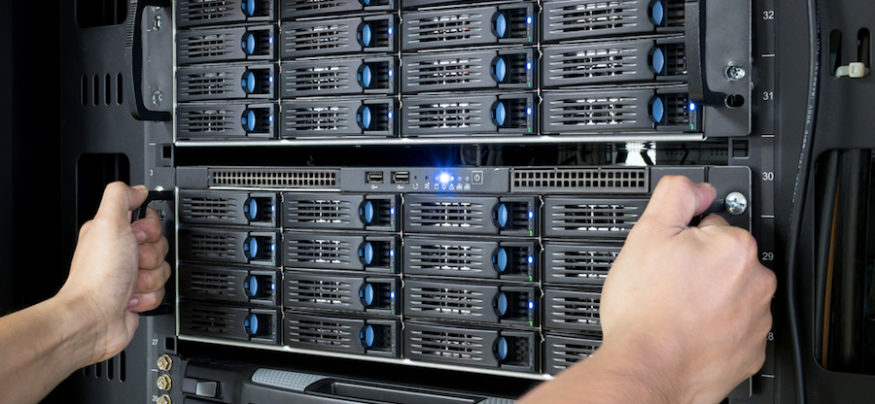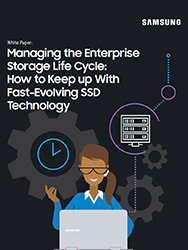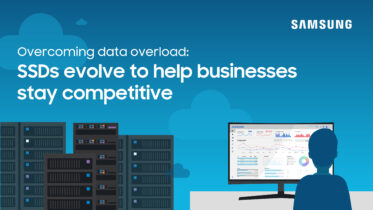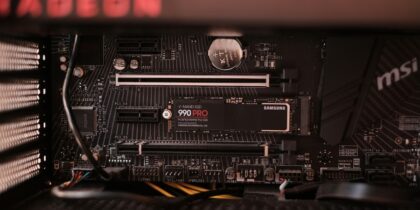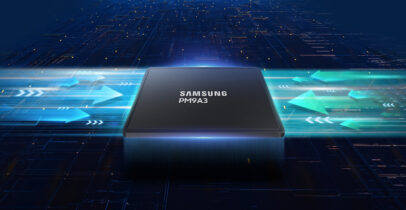Content Delivery Networks (CDNs) are designed to improve load times for data by storing content nearer to the end user, either on the local ISP’s network or on distributed, high-speed servers attached to large, high-speed networks. High-demand content is stored in multiple geographical locations to deliver it to users in close proximity.
Since the servers spend most of their time delivering high-demand content, read speeds are more important than write speeds, files are typically sequential blocks, and multiple simultaneous reads are the norm, while bandwidth and throughput are limited by network speeds. Therefore CDN storage solutions are typically most sensitive to read speeds and service levels — write workloads are typically only about 10% of the total.
The Samsung 860DCT is a new CDN solid state drive (SSD) designed to provide performance optimized for content delivery, with enterprise-class performance, reliability and strong data security. It is optimized for read-intensive applications, with storage capacities of 960GB, 1.9TB, and 3.8TB, and features read speeds of up to 550MB/s with pricing closer to consumer-grade SSDs.
Enterprise-Grade Reliability at Consumer-Level Prices
With the increased capacity and decreasing cost-per-gigabyte for enterprise-class SSDs, storage admins are beginning to evaluate transitioning to all flash storage solutions from traditional hard disk drives (HDDs). Enterprise-class SSDs are designed for enterprise workloads and provide additional features such as power-loss protection (PLP), increased total bytes written (TBW), and drive writes per day (DWPD) compared with traditional HDDs. Because of these additional features, enterprise SSDs also come at a higher cost-per-gigabyte than consumer-class SSD. In addition, with the release of PCIe/NVMe specifications for SSDs, performance has increased with read speeds up to 2,500MB/s for NVMe enterprise SSDs.
Many storage admins may be tempted to specify only PCIe/NVMe drives at this point, due to the speeds they can deliver. However, in a CDN storage solution, throughput is not the most important criteria, and neither is random IOPS.
These enterprise features are important for some applications, such as virtualization and database applications, but in content delivery network storage, files being read are delivered over a typical internet connection, and are high sequential reads, rather high DWPD.
Manage the Enterprise Storage Life Cycle
Download this guide to improve your storage planning and evaluation processes. Download Now
Compared to the price premium for enterprise-class and PCIe/NVMe SSDs, the Samsung 860DCT has a cost-per-gigabyte that aligns more closely with consumer-grade SSD pricing, but with performance that exceeds the typical requirements for content delivery services with 24/7 operation, and enhanced reliability over consumer-grade drives. The 860 DCT is based of Samsung’s 64-layer V-NAND technology, without PLP and with a lower DWPD rating to keep to cost-per-gigabyte down.
Firmware for Optimal Performance in Any Condition
In addition the affordable price point between consumer-grade SSDs and enterprise-grade SSDs, the 860DCT includes the Samsung SSD Toolkit to facilitate maintenance and tuning of CDN SSDs.
The 860 DCT’s enterprise firmware includes support for deterministic TRIM, additional Self-Monitoring, Analysis, and Reporting Technology (S.M.A.R.T) attributes for drive monitoring, and is over provisioned out-of-box at 6.7 percent. Deterministic TRIM allows the host to conduct “garbage collection” after TRIM commands which prevents performance degradation overtime when being used in a 24/7 streaming content environment. The drive can also throttle performance to maintain safe thermal operation if airflow is restricted, ensuring reliable operation even under difficult conditions. Because the 860 DCT is designed for “read-intensive” workloads in the enterprise, client-based firmware features such as intelligent TurboWrite technology, DevSLP (low-power management while idle), and TCG/OPAL 2.0/IEEE1667 have been removed.
Deterministic TRIM Ensures Values Are Always Reliable
The TRIM command allows the operating system to designate blocks on the SSD as not in use. The SSD can determine not to overwrite these blocks with zeros immediately, since the overwrite can result in reads that present different values depending on how long the system takes to wipe the blocks.
Deterministic TRIM ensures that the values are constant once a block has been designated as deleted using the TRIM command, ensuring reliable values. This is especially important for server operations, where multiple users may be accessing the same files. This provides higher-level reliability than consumer SSDs can, without the extra cost of enterprise-grade SSDs.
For content delivery networks and other read-intensive applications like video streaming, social media and webservers, the Samsung 860 DCT offers a good blend of enterprise-grade reliability and high performance with the lower cost-per-gigabyte of consumer-grade SSDs, making it ideal for the large deployments typical of delivery networks.
Find the best storage solutions for your business by checking out our award-winning selection of SSDs for the enterprise.
